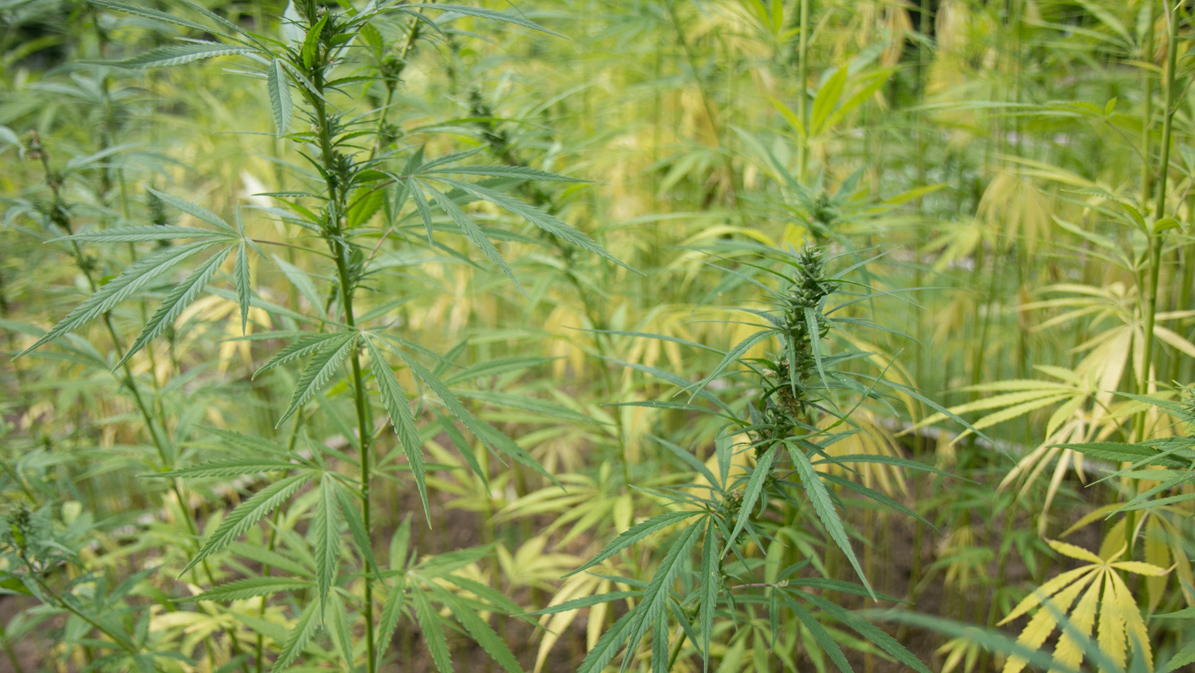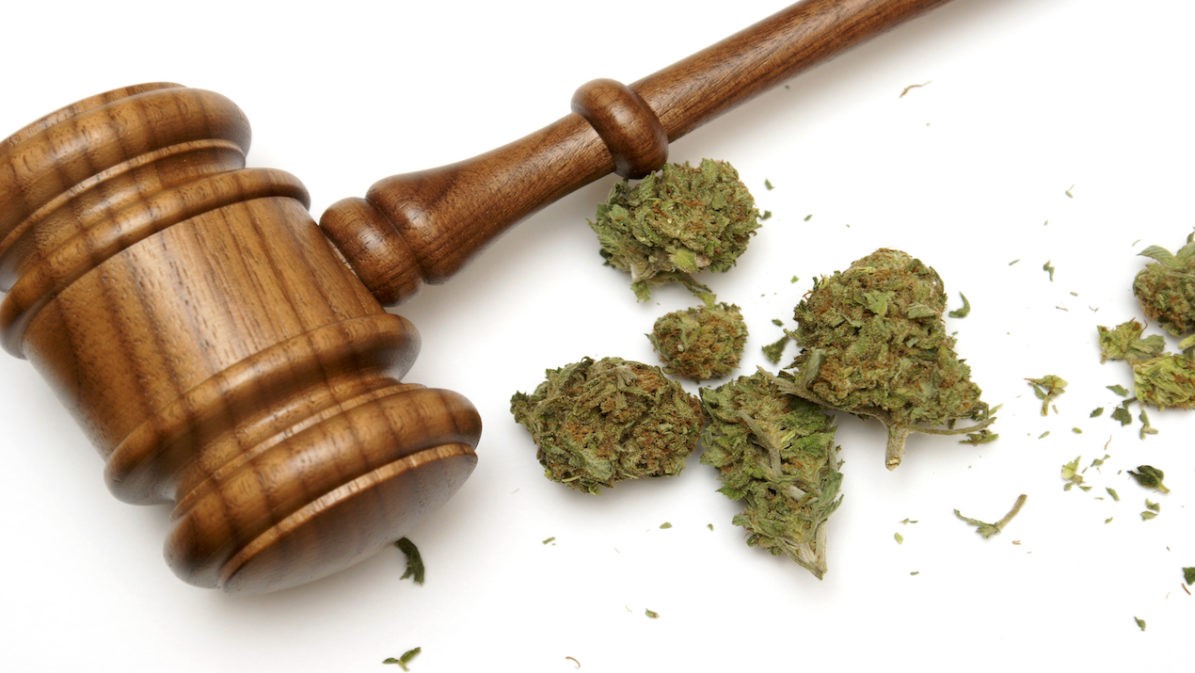
Vogue Fashion Guru Turned Cannabis Farmer Battles Santa Barbara Prohibitionists
Sara Rotman is a powerful advocate for independent cannabis farmers across the country.
The Vogue-proclaimed “fashion branding guru” co-founded the agency MODCo in New York City. Her career flourished as a graphic designer, creating iconic design mainstays such as the Tori Burch logo. Then a life-threatening illness changed Rotman’s path, and she decided to leave her fashion company to find healing in California.
Rotman and her husband Nate Ryan co-founded the Busy Bee’s Organics collective in 2015, located just north of Santa Barbara in Buellton, California. It includes 100,000-square-feet of cannabis plants on a 63-acre ranch and is now the largest legal outdoor cannabis grow in the state.
The farm is currently being sued by prohibitionist neighbors in Santa Barbara County, on the basis of an environmental protection law called CEQA. The neighbor’s goal is to bankrupt the farm and all cannabis farms in the area with legal fees, fully aware the suit is unwinnable.
Green Entrepreneur spoke with Rotman about what brought her to start her own cannabis farm, how her passion for farming and cultivating has translated into her brand Wellfounded Botanicals, and the difficult hurdles that cannabis opposition groups are imposing on the industry.
What lead you to cannabis, tell our readers a bit about your health journey to plant-based medicine?
Sara Rotman: The short answer is, grave illness. I was not a cannabis recreational user, I didn’t have a lot of vision to go into that part of the business. I got very very sick, western medicine didn’t have anything for, me I went through traditional medicine and it didn’t have anything to offer me.
A couple more hospitalizations, I got poisoned by some of the medicine they gave me and in fact, ended up with liver failure due to the medicine they gave me. It wasn’t actually helping. Because of desperation, my husband at the time encouraged me to try cannabis. Which, I didn’t know enough about. I was a little weary because I don’t tolerate the psychotropic effects very well, he was the first to tell me about CBD, the difference of the high CBD and low THC. I had to try.
At the time I didn’t know it was possible to take cannabis therapies without smoking. I didn’t understand what was possible, that was an exciting thing to learn. That there was so much more one could do with cannabis as therapy than what I had just known smoking cannabis socially.
We were experimenting with tinctures. During that time, I got arsenic poisoning in the early days of medical cannabis. I got arsenic poisoning from a batch of tincture concentrates. I got dosed with super high THC, that was labeled high CBD. We went through some very troubling, inconsistent batches of different stuff we got from different medical collectives in the unregulated market. And that’s when we really decided the only way to control what the quality of cannabis that we were ingesting was to grow it ourselves.
By that time, because the illness I was suffering from was severe Crone’s Disease, we had already started converting our farm to organic practices and started growing all our own food to control my symptoms. So we decided to start growing cannabis just to be able to control our supply. We founded a collective, and this is back in 2015, and that was sort of the thing that started our journey and boy was it a sweet burning trip.
What have you learned from your fashion career founding MODCo that you have brought to the cannabis space?
The best piece of advice I ever got about growing cannabis was from a very talented grower, a female friend of mine. She said, “Sara, growing good cannabis is 99 percent observation. Once you learn to observe, you really notice a plant before it is sick, when it’s unhealthy, what it’s doing, how it’s expressing itself, what it needs.” I have to say being a graphic designer or a branding person, that is very, very familiar to me.
The hour of the observation is one of the most important things that you do when you’re creating or protecting a brand. You’re observing how customers react to it, or how the brand is perceived, how every single bit of communication and every tiny, detailed nuance supports the brand strategy.
This idea of observing the cannabis plant, it sounds improbable because they are such different things, but the concept of observation was very familiar to me. The extraordinary, hyper-detailed paying attention to everything in that plant’s universe, and what impacted it, became a very comfortable place. It was something I found beauty and poetry in. It was very familiar.
As an entrepreneur, running a business, it is the same. The idea that you are flying without a net. You can’t fail, you can’t fail, you can’t fail. Even if you have failure, you have to pick yourself up and you can’t fail. “No choice is also a choice,” is something we say on the farm and that means that we have to embrace this with optimism because we are probably going to get kicked in the teeth over and over again. We have to get up and do it with a smile on our face and get it done right every single time.
That is very familiar to me. I started my business from nothing, paid my way to go to school in New York City, grew my company to be a very well respected, successful company, kept it until I got too ill to work. It was that very New York City thing, if you can make it here, you can make it anywhere. It was really hard, extremely challenging, brutal, and unforgiving in every possible way. I have to say, I have seen a lot of parallels coming into the legal cannabis market, and trying to establish ourselves as California establishes itself. It is not for the faint of heart.
What challenges are wholly unique to cannabis cultivation, that other industries may not have to face, really don’t have to worry about?
In a word answer, it would be regulation.
Regulation, but also, I’m not opposed to regulation. As I have said, I am sort of the victim of unregulated cannabis markets. I really believe in creating a safe, reliable product with transparency for our consumers and patients, but the myriad levels of regulation that happened in California between the state and local levels add a layer of complexity that is exceedingly difficult.
“It is just like starting any business: it will be deeply uncomfortable for the first 5 years and a little uncomfortable for the rest of your life. But the good stuff in between is worth it.”
-Sara Rotman, Wellfounded CEO
What I didn’t expect, that wasn’t in any of our business plans or even on our radar, was the amount of political activity, the political activism that is necessary to stay alive in this industry. I think that is pretty unique to cannabis. I understand other industries have regulations, certainly. The alcohol industry and the oil industry are two big ones in California, and I don’t know what they experience.
But from a farming perspective, when you talk about a plant that is grown in the ground, we are the most regulated thing on the planet. Just to achieve our license status, we had to go through dozens of state and local government agencies’ approval, requirements. We are experiencing checks and balances from them. That is more than anything else really that historically had ever been the case. That is very challenging, very labor-intensive, the monitoring of that, making sure you don’t miss a beat on that, is pretty staggering.
The other thing is, we’re still experiencing the hangover of unfortunately of Reefer Madness. And we see a lot of noisy prohibitionists really pedaling their influence over politicians in our local area. And really creating a problem for them, in opposition to the voting public, who overwhelmingly voted for it.
We see people try to circumnavigate our civic progress to achieve their goal of reigniting a prohibition on cannabis, and I think that is really unique to our industry. And it’s really uncomfortable.
Tell me about your 63-acre ranch just north of Santa Barbara? How many vegetables, fruits are you growing in addition to cannabis, and what is the farm life like coming from NYC, and such a fast-paced industry?
We have an obscenely large personal vegetable garden where we grow. I do a lot of peppers and tomatoes, I must have 15 varieties of each. And we also have 600 olive trees, and so we are starting to do olive oil. I am really excited. We are eventually launching a hot sauce and edible brand. We want to make sure everything we create uses flavors from products we are growing on the farm.
For example, our tincture for Wellfounded has natural pomegranate flavor, and that pomegranate we are growing on the farm as well. We just want to make sure everything put into it is local. If it’s possible to be grown within a 100-mile radius, we want to grow as much as we can on the farm. We are also extending that into foodstuff, which I am really excited about. We also do our own beef, chicken, pork for our family freezer.
We’re very lucky, we are in a good spot, I am extremely grateful for that. It’s quite the about-face, I think the urban jungle trained me for this a little bit, but in most ways, it just made me tenacious.
I am excited to hear about your new THC and CBD brand Wellfounded, and congrats on its launch. Which cannabis consumer do you want Wellfounded to represent and speak to?
We are very excited, I am thrilled. I just can’t wait to have, in particular, because the first two products we are coming out with for me are my primary method of therapy for myself. So the topicals and tinctures, and then the capsules, I just love them. I think they are very effective, beautifully done. They were designed to aid me in my illness. I’ve really been developing it with my close friends who have experiences of other things, even my mother-in-law who also struggled with autoimmune stuff. So I am thrilled to get it out into the world.
That’s a fair question, and it is broad. We are looking for a wellness-minded consumer. We speak to women more than men but it is not a brand that is exclusive to women, it is for men and women and anyone in between. It is a health-minded and an aesthetically driven person.
This will be therapy. This for me relieves pain or inflammation, but it’s also something that could be as enjoyable with that glass of wine at the end of the day, something to be social with friends. Our pomegranate tincture in some soda water, you can have it socially. It’s definitely for wellness-minded people with the eye for farm to table passion. We have that farm to table perspective. We are sun-grown, we are really proudly sun-grown, we live in the best growing area in my opinion in the world. I want our products that reflect that bounty. People who would enjoy our brand are people who appreciate that type of lifestyle.
I want to know more about the work you are doing to advocate for independent cannabis farmers?
We are very fortunate in Santa Barbara. When they first drafted the ordinance, they allowed us to consider ourselves from an agricultural scale perspective. But even with that, we have a structure in our county where the appeal process is forgiving for any opponent and extremely arduous for someone to make it through. And it is possible for someone to bankrupt a small independent farmer in order to prevent them from coming online in a fully compliant way.
We have seen that as a tool for people to promote the prohibition stance. That is the hardest thing for independent farmers, you don’t have unlimited funds to survive through it. For some, it’s an extremely difficult and insurmountable task. Being comfortable being uncomfortable is something I have spent a lot of years doing. We were prepared for this and it didn’t make it easier. It continues to be painful and continues to be a threat. They know if somebody is not well-funded, they are easy to destroy and bleed them dry financially with all the appeals processes and the challenges to get through.
We need to stand by what is right, we want to protect farmers. As I mentioned before, I have a certain amount of stamina and tenacity and in some cases, a stubbornness that makes me pretty well equipped perfect to take on these types of challenges. I saw it as a kismet role for me to fall into. I am very fortunate that I work with fellow farmers who create medicine.
Our farm was first, and so we become somewhat of a lightning rod.
What other possibly unique challenges do independent farmers face? What challenges do craft brands face?
The brand part and farming part are two equal challenges that are just different.
The hard part of all of us, the independent part, is the cost. It is staggering. People would be shocked if they saw the balance sheet for the costs of remaining compliant, to make it all the way through state licensing and local permits. I had no idea going into it. It is daunting, it is the reason a lot of our fellow farmers up north are having such a hard time because they are not able to scale up, because of the requirements of their jurisdiction. They want to scale up but can’t.
What advice do you have for someone who wants to follow in your footsteps and make their own way in the cannabis industry?
I would say, absolutely do it. I love it and I encourage all of you. I don’t want the hardness to be a discouragement.
Be very thoughtful about where you put your farm. Absolutely make sure if you know If it’s a moving target or if you’ll be able to procure your entitlement. And just stick to it, it’s going to be hard and you will have haters. But it’s worth it, it’s worth it, it’s worth it. It is just like starting any business: it will be deeply uncomfortable for the first 5 years and a little uncomfortable for the rest of your life. But the good stuff in between is worth it.
If you can do it without taking partners and remaining independent, then you are much more in control of the quality of the business you run, the care you provide your employees, and your customers. If there is any possible way to take it without partners I would do it, that is the number one thing I would do. I would prefer to stay smaller through being independent than just take on a lot of partners and find a way through that. I have seen a lot of farms really and struggle with taking on partners. Bootstrapping and growing organically would be the best advice I could give.
First posted on Green Entrepreneur Read More
DISCLAIMER: Cannabiz Digital does not sell cannabis. This publication covers business topics surrounding legal cannabis in California and the United States. It does not provide legal or medical advice. Consult your physician, lawyer, and local laws regarding cannabis. We do our best to provide current information at the time of publishing with no guarantees to accuracy. We understand this industry changes quickly and welcome your feedback. [Send Feedback]
RELATED POSTS
Happy Highs: Cannabis Brands Find Success Marketing Joy and Well-Being
Cannabis makes you feel good. A simple yet powerful tool to market in the modern pandemic world. In 2020, how could consumers not be compelled to try for more joy, to seek happiness or some sort of relief from the chaos of the world? I want to feel good. I dislike feeling bad. The news cycle, with the pandemic and faltering economy, has gotten dark. Cannabis offers a ray of hope in these unprecedented times. When it comes to cannabis for depression, anxiety, PTSD,
House Votes To Protect State Cannabis Laws From Federal Interference
The House of Representatives on Thursday voted in favor of an amendment to protect all state, territory and tribal marijuana programs from federal interference. The measure, which would prevent the Department of Justice from using its funds to impede the implementation of cannabis legalization laws, passed in a 254-163 vote on the floor. Earlier in the day, it had been approved in an initial voice vote. Reps. Earl Blumenauer (D-OR), Tom McClintock (R-CA), Eleanor Holmes Norton (D-DC) and Barbara Lee (D-CA) sponsored
Long Beach City College to offer first cannabis industry class
For the first time in its history, Long Beach City College will be offering a class solely focused on the cannabis industry. From cultivation to retail, the eight-week class will cover all sectors of the industry, additional sessions on the history of cannabis in California and an overview of the state’s track-and-trace system for cannabis products from plant to the hands of consumers. “If somebody is interested in engaging with the cannabis industry on a professional level, this is an important first



